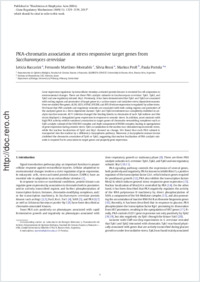PKA-chromatin association at stress responsive target genes from Saccharomyces cerevisiae
- Baccarini, Leticia Departamento de Química Biológica, Facultad de Ciencias Exactas y Naturales, IQUIBICEN-CONICET, Universidad de Buenos Aires, Argentina
- Martínez-Montañés, Fernando Department of Biology, University of Fribourg, Switzerland
- Rossi, Silvia Departamento de Química Biológica, Facultad de Ciencias Exactas y Naturales, IQUIBICEN-CONICET, Universidad de Buenos Aires, Argentina
- Proft, Markus Instituto de Biomedicina CSIC, Valencia, Spain
- Portela, Paula Departamento de Química Biológica, Facultad de Ciencias Exactas y Naturales, IQUIBICEN-CONICET, Universidad de Buenos Aires, Argentina
-
25.09.2015
Published in:
- Biochimica et Biophysica Acta (BBA) - Gene Regulatory Mechanisms. - 2015, vol. 1849, no. 11, p. 1329–1339
English
Gene expression regulation by intracellular stimulus-activated protein kinases is essential for cell adaptation to environmental changes. There are three PKA catalytic subunits in Saccharomyces cerevisiae: Tpk1, Tpk2, and Tpk3 and one regulatory subunit: Bcy1. Previously, it has been demonstrated that Tpk1 and Tpk2 are associated with coding regions and promoters of target genes in a carbon source and oxidative stress dependent manner. Here we studied five genes, ALD6, SED1, HSP42, RPS29B, and RPL1B whose expression is regulated by saline stress. We found that PKA catalytic and regulatory subunits are associated with both coding regions and promoters of the analyzed genes in a stress dependent manner. Tpk1 and Tpk2 recruitment was completely abolished in catalytic inactive mutants. BCY1 deletion changed the binding kinetic to chromatin of each Tpk isoform and this strain displayed a deregulated gene expression in response to osmotic stress. In addition, yeast mutants with high PKA activity exhibit sustained association to target genes of chromatin-remodeling complexes such as Snf2-catalytic subunit of the SWI/SNF complex and Arp8-component of INO80 complex, leading to upregulation of gene expression during osmotic stress. Tpk1 accumulation in the nucleus was stimulated upon osmotic stress, while the nuclear localization of Tpk2 and Bcy1 showed no change. We found that each PKA subunit is transported into the nucleus by a different β-karyopherin pathway. Moreover, β-karyopherin mutant strains abolished the chromatin association of Tpk1 or Tpk2, suggesting that nuclear localization of PKA catalytic subunits is required for its association to target genes and properly gene expression.
- Faculty
- Faculté des sciences et de médecine
- Department
- Département de Biologie
- Language
-
- English
- Classification
- Biological sciences
- License
- License undefined
- Identifiers
-
- RERO DOC 257834
- DOI 10.1016/j.bbagrm.2015.09.007
- Persistent URL
- https://folia.unifr.ch/unifr/documents/304563
Statistics
Document views: 71
File downloads:
- mar_pca.pdf: 191
